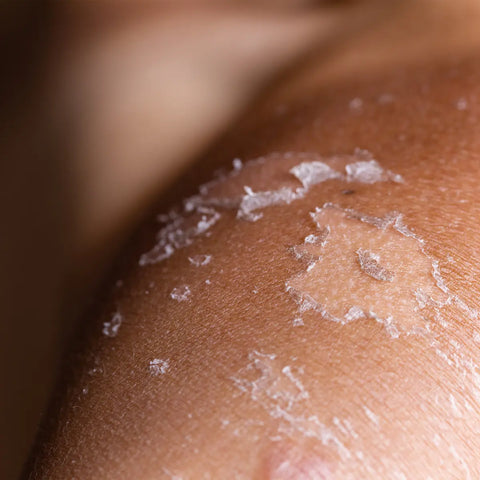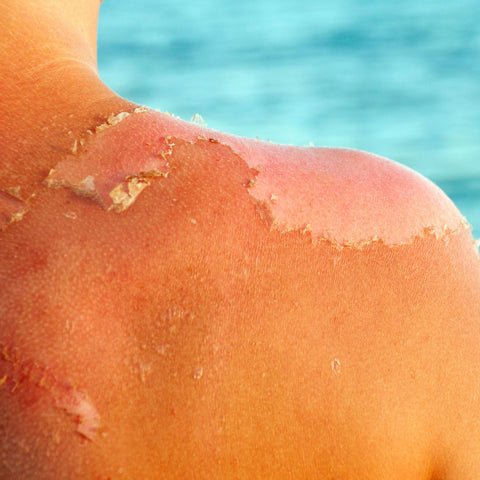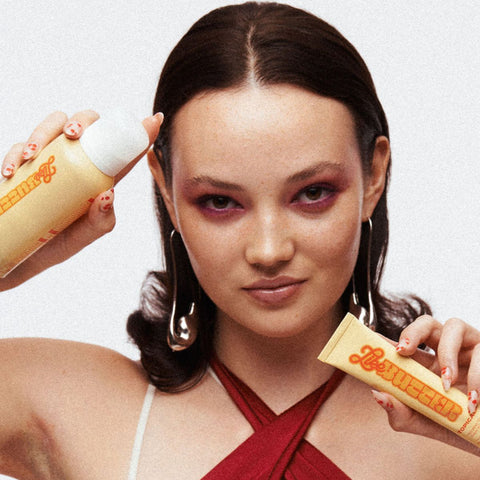Spend $75+, get Slick Salve Mint FREE
How To Treat Skin Peeling
·Jazmine Roxas

Skin peeling is a prevalent issue that many people encounter, stemming from various causes such as natural regeneration, environmental factors, or specific skin conditions. Whether it's due to the aftermath of a sunburn, the result of dryness, or a symptom of an underlying condition like eczema or psoriasis, understanding how to prevent and treat peeling skin is essential for maintaining a healthy, vibrant complexion. This blog aims to delve into the comprehensive care of peeling skin, offering insights into prevention techniques, effective treatments, and recommended products to nurture and protect your textured skin face. From the significance of hydration and sun protection to the gentle use of exfoliants and the importance of selecting suitable skincare products, we'll explore various strategies to combat peeling skin and promote overall skin health.

How To Prevent Peeling Skin
There are several steps you can take to prevent peeling skin:
Hydrate Your Skin
Dry skin is more prone to peeling, so it's important to keep your skin hydrated by drinking plenty of water and using a moisturizer regularly. Choose a moisturizer that is suitable for your skin type and apply it to your skin after cleansing and toning.
Protect Your Skin From The Sun
Sunburn not only causes discomfort but also damages skin cells, leading to peeling as the skin attempts to heal and regenerate. Such damage can accelerate skin aging and increase the risk of skin cancer. Therefore, adopting effective sun protection measures is crucial for maintaining healthy skin. Here are detailed strategies to prevent sunburn:
- Wear Sunscreen: Opting for a sunscreen with at least SPF 30 is essential. SPF, or Sun Protection Factor, measures how well the sunscreen can protect the skin from UVB rays, the kind of radiation that causes sunburn and contributes to skin cancer. A product with SPF 30 blocks approximately 97% of these harmful rays. When selecting sunscreen, look for broad-spectrum options that protect against both UVA (which can age the skin) and UVB radiation. Apply a generous amount to all exposed areas of the skin, including often-missed spots like the tops of the ears, the back of the neck, and the tops of the feet.
- Apply Early and Often: Sunscreen should be applied 15-30 minutes before you go outside. This time allows the sunscreen to properly adhere to the skin, creating a protective barrier before exposure to the sun. It's not enough to apply just once; sunscreen must be reapplied every two hours, or more frequently if you are swimming or sweating. This ensures continuous protection, as the effectiveness of sunscreen diminishes over time due to exposure to sunlight, water, or even being absorbed into the skin.
- Reapply Regularly: Consistent reapplication of sunscreen every two hours is crucial, especially on long days spent outdoors. Sunscreen can easily wash off during swimming or fade through perspiration, leaving the skin unprotected. After toweling off, a fresh layer of sunscreen should be applied to ensure that protection is maintained. This practice is essential for all skin types, even those that do not burn easily, as damage from UV radiation can occur even without visible signs of sunburn.
- Cover Up: Beyond sunscreen, physical barriers such as clothing, hats, and sunglasses offer significant protection. Wearing tightly woven, loose-fitting clothing covers the skin, reducing UV exposure. A wide-brimmed hat protects the face, ears, and neck, areas particularly vulnerable to sun damage. Sunglasses with 100% UVA and UVB protection shield the eyes and surrounding skin, preventing eye damage and crow's feet. These measures are particularly important during peak sun intensity hours, usually between 10 AM and 4 PM.
Incorporating these sun safety habits into your daily routine can significantly reduce the risk of sunburn, contributing to long-term skin health. Sun protection is a critical aspect of overall wellness, helping to prevent premature skin aging, sunburns, and skin cancer. By following the outlined steps, individuals can enjoy outdoor activities while ensuring their skin remains protected and healthy.
Avoid Harsh Skincare Products
Selecting the right skin care products is crucial for maintaining your skin's health and vitality. Harsh ingredients can strip your skin of its protective oils, leading to irritation, dryness, and peeling. To prevent such issues and promote a radiant complexion, consider adopting the following comprehensive skincare practices:
- Avoid Harsh Ingredients: Products containing alcohol, sulfates, and artificial fragrances can be too abrasive for the skin, especially for those with sensitive or dry skin types. These ingredients can disrupt the skin's natural barrier function, leading to increased sensitivity, dryness, and even eczema or acne breakouts. It's important to choose products formulated without these harsh chemicals to prevent stripping the skin of its natural oils and causing irritation. Avoiding such ingredients is crucial for maintaining skin health, as they can remove essential moisture and impair the skin’s ability to repair itself.
- Opt for Gentle Products: Gentle skincare products are formulated to support the skin's natural balance, offering hydration and nourishment without causing harm. Look for products with soothing ingredients such as aloe vera and chamomile. These ingredients help to calm inflammation, hydrate the skin, and reinforce the skin's barrier, making them ideal for all skin types, including sensitive and acne-prone skin. Choosing gentle products can significantly improve your skin's condition by preventing the aggravation of existing skin issues and promoting a smoother, more balanced complexion.
- Read Labels Carefully: Understanding the ingredients in your skincare products is key to avoiding those that may cause harm. Ingredients are listed in order of concentration, so those listed at the beginning have the highest concentration. Avoid products with long lists of unrecognizable ingredients, and instead focus on those with fewer, more natural components. This minimizes the risk of skin irritation and allergies, promoting healthier skin. By becoming informed about the ingredients and their effects, you can make more educated choices that align with your skin’s needs.
You may greatly enhance the appearance and health of your skin by including these recommendations in your skincare regimen. y selecting the right products and paying attention to your skin's needs, you can achieve a glowing, healthy complexion free from irritation and damage. Remember, the goal is to nurture your skin, providing it with the care and protection it deserves.
Treat underlying skin conditions
Effectively managing skin conditions is vital for reducing symptoms such as peeling skin, a common issue for individuals with eczema or psoriasis. Each condition requires a distinct treatment approach to alleviate discomfort and improve skin health. Here’s a detailed look at the characteristics and management strategies for these skin conditions:
- Eczema (Atopic Dermatitis): Eczema is a chronic condition characterized by inflamed, itchy, and red skin. When the skin becomes overly dry or irritated, it can lead to peeling, adding to the discomfort. Proper management focuses on maintaining skin moisture through regular application of emollients and moisturizers. These products help to form a protective barrier, preventing moisture loss and shielding the skin from irritants and allergens. Additionally, avoiding harsh soaps and frequent bathing, using lukewarm water, and applying moisturizers immediately after bathing are essential steps. For severe cases, dermatologists may prescribe topical steroids or immunomodulators to control inflammation and relieve itching.
- Psoriasis: Psoriasis involves the rapid buildup of skin cells, which form thick, scaly patches that can be silver or red. These patches often crack and peel, causing significant discomfort. The primary treatment focus is on slowing down cell turnover and maintaining skin hydration to prevent cracking. Topical treatments, such as corticosteroids and vitamin D analogs, are commonly used to reduce cell production and inflammation. Light therapy or phototherapy is another effective treatment method, exposing the skin to ultraviolet light under medical supervision to help slow cell turnover. For more severe forms, systemic medications or biologics may be necessary to target the underlying immune processes causing the overproduction of skin cells.
Understanding and addressing the specific needs of skin affected by eczema or psoriasis is critical. These conditions not only cause physical discomfort but can also impact emotional well-being. An individualized treatment plan developed with a healthcare professional can lead to better management of symptoms, improving both skin health and quality of life. This approach enables patients to maintain a more normal skin appearance and reduces the incidence of peeling and irritation.

How To Treat Peeling Skin
To treat skin peeling, it's important to first determine the underlying cause. If the peeling is due to natural exfoliation or a chemical peel, no treatment may be necessary. However, if the peeling is caused by dry skin, using a moisturizer regularly can help to hydrate the skin and prevent further peeling.
For sunburned skin, it's important to protect the skin from further sun exposure and to use a moisturizer to help soothe and hydrate the skin as it heals. Over-the-counter pain medication can also be used to help reduce discomfort.
Best Skin Products For Peeling Skin
Skincare products that can help treat peeling skin include moisturizers, exfoliants, and treatments containing ingredients that soothe and nourish the skin.
Moisturizers
The effectiveness of a moisturizer largely depends on its ingredients; hyaluronic acid and ceramides are among the most beneficial for retaining moisture. Hyaluronic acid, a naturally occurring substance in the skin, has the unique ability to attract and hold vast amounts of moisture—up to 1,000 times its weight in water. This makes it an exceptional ingredient for hydrating the skin deeply, improving its texture, and reducing the appearance of peeling. Ceramides, on the other hand, are lipid molecules found naturally in the skin's barrier. They play a crucial role in preventing moisture loss and protecting the skin against environmental aggressors. Products that replenish the skin's ceramide levels can help restore the skin's natural barrier, reducing dryness and peeling. Additionally, for severely dry and peeling skin, using a heavier, more nourishing moisturizer such as serum cream or ointment is advised.
When selecting a moisturizer, it's important to choose a product that is suitable for your skin type and condition. Applying moisturizer on damp skin, such as after a shower or bath, can enhance absorption and effectiveness. For an added boost of hydration, incorporating products for textured skin with ingredients like glycerin, which draws water into the skin, and niacinamide, which improves the skin's elasticity and barrier function, can be beneficial.
Exfoliants
Exfoliants serve an important role in the treatment of peeling skin by facilitating the removal of dead skin cells and promoting cell turnover, which can rejuvenate the skin's appearance and texture. Exfoliation, when done correctly, can unveil healthier, smoother skin beneath the peeling layers. Chemical exfoliant serums, including those containing alpha-hydroxy acids (AHAs) like lactic acid and glycolic acid, are particularly beneficial. Milder lactic acid works by loosening the bonds between dead skin cells, making it an excellent choice for sensitive skin or those new to exfoliating. Glycolic acid, a bit stronger, penetrates deeper into the skin, offering more intensive exfoliation, which can be beneficial for more persistent areas of peeling or for individuals with a higher tolerance to exfoliants.

Benefits of Specialized Serums for Skin Health
As emphasized before, serums are powerful allies in addressing specific skin concerns due to their concentrated formulations and deeper penetration capabilities. For those dealing with textured skin or seeking to brighten their complexion, incorporating specialized serums can make a significant difference.
Body Serums for Overall Skin Enhancement
While the face often receives the most attention in skincare routines, the skin on the body also requires nourishment and care. Body serums are designed to target larger areas and are typically richer in hydrating and restorative ingredients. These serums can improve skin elasticity, hydration, and overall texture, making them ideal for use after bathing when the skin can most effectively absorb their benefits.
Brightening Serums for a Radiant Glow
Brightening serums are infused with ingredients like vitamin C, niacinamide, and various botanical extracts that help to lighten hyperpigmentation and even out skin tone. Regular use of a brightening serum not only diminishes the appearance of dark spots but also imparts a luminous glow to the skin, enhancing its overall health and appearance.
Serums for Specific Needs
Choosing the right serum depends largely on individual skin concerns. A serum for textured skin with smoothing and refining properties is ideal. If the goal is to achieve a brighter, more even complexion, a serum formulated with skin-lightening agents will be most effective. For comprehensive skin health, especially for those dealing with dryness or uneven texture, a hydrating body serum can be particularly beneficial.
Managing and preventing skin peeling involves a holistic approach that emphasizes hydration, protection from harmful UV rays, and the careful selection of textured skin products. By adopting a regimen that includes drinking ample water, applying sunscreen diligently, choosing gentle skincare products, and treating any underlying skin conditions, you can maintain a healthy and resilient skin barrier. These practices not only help in preventing peeling but also contribute to a more vibrant, youthful appearance of the skin. Embracing these habits as part of your daily skincare routine ensures that your skin remains nourished, protected, and in its best condition, reflecting your overall well-being and confidence.